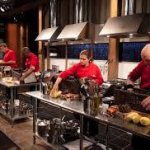 Rosalind and I really enjoy watching a TV program on the Food Network called Chopped. It is a simple idea. 4 chefs compete with each other by making an appetizer, entrée, and dessert. They are given surprise ingredients, often ones that are weird. The chefs may get cotton candy, pickled pigs feet, yogurt, and green peppers for the starter. They have 20 or 30 minutes to invent something and serve it to the judges, who are superstar chefs.
Rosalind and I really enjoy watching a TV program on the Food Network called Chopped. It is a simple idea. 4 chefs compete with each other by making an appetizer, entrée, and dessert. They are given surprise ingredients, often ones that are weird. The chefs may get cotton candy, pickled pigs feet, yogurt, and green peppers for the starter. They have 20 or 30 minutes to invent something and serve it to the judges, who are superstar chefs.
What I have really learned by watching the show is how the judges think so compositionally. They are always very structural: this, in relationship to that, contrasting flavors, textures, colors, immediate, Vs. longer lasting, and various elements of a dish weighed against other elements.
In each round, one of the competitors gets “chopped.” In other words, he or she loses. The appetizer round begins with 4 chefs, and one of them is then chopped, the entrée round has 3 competitors, and one of them is chopped, and the desert round has 2 competitors, and one of them is chopped, and one of them wins.
It is fun. But there is another dimension going on that most people might not notice, and that is the underlying assumptions of the competing chefs. It might be a cultural phenomenon, but so many of them seem like refugees from the self-help movement.
For example, many of them claim they would win because they have the most positive attitude, or they are the most sincere, or somehow they deserve it because they have worked so hard in their lives. There is a lot of talk about determination and intention. The underlying assumption is that winning has most to do with mental attitude, rather than the food they create. This notion actually makes them less competitive, given it is a food competition, and winning or losing is directly related to the food they make.
Most of them have dramatic life stories, “I’m doing this for my dead grandfather, who taught me how to cook,” or “I was a drug addict and I got my life to together by cooking, and I want to prove that people can change,” or “I am doing this to prove to myself that my decision to be a chef was the right on.”
Some think they should win because they have the most experience, or because they are more inventive, or because they have talent. Seems most of them have a rational why they SHOULD win. 4 chefs, only one winner. That means, 3 of them are going to lose, no matter what they claim their reason for winning is.
When they lose, there is that long walk to the green room, and they get to say what their reaction is to having been chopped. Some of them say they were robbed, and the judges didn’t call it right. Some of them say it wasn’t their day, or they had trouble with the oven, or that they had never worked with one of the ingredients before. Some say at the beginning of the program how much this means to them, but if they lose, it is all sour grapes: “This is only one little thing, and I know I’m a great chef!”
In all the time we’ve been watching the program, only once did one of the losing chefs say that he lost because the other contestant produced a better dish than he did. He, as it happens, was French. So far, there have been no Americans that have admitted to being beaten fair and square.
So much of what we see is the manifestation of identity issues taken up an octave. Most of these chefs confuse their abilities and talents with who they are. They have trouble admitting losing a contest with 3 other highly capable competitors because they didn’t do as good a job. No one likes to lose, no one likes to be rejected, no one likes to be chopped. Yet, it is nothing personal. Let’s say you did the best you could, and so did the competitors. And, someone else’s best was better than your best. How is that personal? But the explanations tell the story.
When what you do is confused with who you are, failure, which comes with the territory in a contest in which 4 equally talented people compete against each other, leads to a slight identity crisis.
Chefs, you are not the food you cook. If you were, you would disappear the moment someone ate your food.
